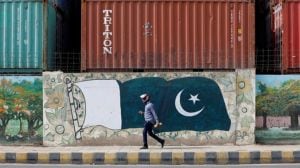A poor law?
The Economist joined the discussion on India8217;s 8216;8216;poor law8217;8217;. It described the UPA government8217;s dilemma: to bal...

The Economist joined the discussion on India8217;s 8216;8216;poor law8217;8217;. It described the UPA government8217;s dilemma: to balance enthusiasms about the 8216;8216;historic opportunity to weave India8217;s first reliable social safety net8217;8217; with apprehensions about the toll it might take on the budget deficit. In practice, it8217;s a 8216;8216;policy trilemma8217;8217;: to juggle the three goals of an unconditional guarantee of employment, at the minimum wage, without intolerably straining the budget deficit.
The magazine invoked John Stuart Mill, who described the appeal of poor-law relief to be that 8216;8216;it is available to everybody but it leaves to every one a strong motive to do without it if he can8217;8217;. For that, the wages, said Mill, must be set at levels where they 8216;8216;give the greatest amount of needful help, with the smallest encouragement to undue reliance on it8217;8217;.
So does India8217;s law pass the test? In Maharashtra, said the Economist, the EGS has fared better than other welfare schemes. This is in spite of the corruption and leakages and despite the carping by critics that not enough enduring public assets may have been built as a consequence. For the Economist, in any case 8216;8216;8230; the real value of the public works lie not in the orchards they plant, but in the safety net they provide8230;8217;8217; Maharashtra8217;s EGS fared well, the magazine argued, at least till 1988, when the minimum wage was doubled overnight, leading to the tacit rationing of jobs.
But what about the new law framed by the Centre? The Economist saw the UPA government8217;s two-fold dilution at the very outset as a bad augury. The government has backed away from the commitment to a minimum wage set by each state, it has restricted the guarantee to 100 days of work to households officially classified as poor. The government8217;s 8216;8216;poverty fighting ambitions8217;8217; may be caving in to its 8216;8216;fiscal apprehensions8217;8217;, feared the magazine.
Himalayan mess
Nepal8217;s turbulence rippled weakly in the western media all week. Why, indeed, must the world take serious notice of a remote Himalayan kingdom, where the king just sacked a multi party government, put ministers under house arrest, the country in a state of emergency, shut down telephone and internet links, all in the 8216;8216;larger interests of the people8217;8217;, all the while professing himself a champion of multiparty democracy?
The Wall Street Journal Asia spelt out at least one reason why people other than mountain climbers must be concerned that options in Nepal are narrowed down to the King or the Maoists 8212; the latter have expressed confidence that one day they will hoist the red flag on Mount Everest. Nepal8217;s location on the map between India and China worries the Journal: 8216;8216;Never close friends at the best of times, Asia8217;s two giants don8217;t need to have this spot of trouble at a time when both are trying to focus on economic growth. Should the king8217;s actions lead to a victory by Maoist rebels already besieging Kathmandu, we could then have a chaotic state exporting terrorism next door8217;8217;.
In the Guardian, columnist and writer Isabel Hilton warned the west against going along with the King8217;s description of the Maoists as 8216;8216;terrorists8217;8217; and the parallels he attempts to draw between Nepal8217;s situation and the al Qaeda-style 8216;8216;terrorist challenge8217;8217;. The military solution had already been tried in Nepal, she wrote. And 8216;8216;Now it is time to talk 8212; if the Maoists are still picking up the phone.8217;8217;
Jolie8217;s way
Can Angelina Jolie really change the world? That8217;s the question the New York Times asked last week. But the question isn8217;t entirely in jest, nor is the NYT asking it alone. Many in the American and British media have come back from Davos with the sneaky suspicion that the power of celebrity might yet do for humanity what politicians, economists and activists can8217;t.
Time magazine recalled Sharon Stone8217;s sterling performance at a plenary session on fighting poverty at the World Economic Forum. The star of Basic Instinct stood up to coax instant donations from the distinguished audience amounting to 1 million for the fight against malaria in Tanzania. Jolie made people listen as she spoke of her experiences in Cambodia.
More and more celebrities appear to be staying with the cause and that8217;s good 8212; for the cause. It was in some measure due to some engaged star power, Time appeared convinced, that this year at the World Economic Forum, perhaps the only meet that describes itself as 8216;8216;Committed to Improving the State of the World8217;8217;, Poverty in the Developing World trumped Internet, Terrorism, Iraq.
- 01
- 02
- 03
- 04
- 05






























